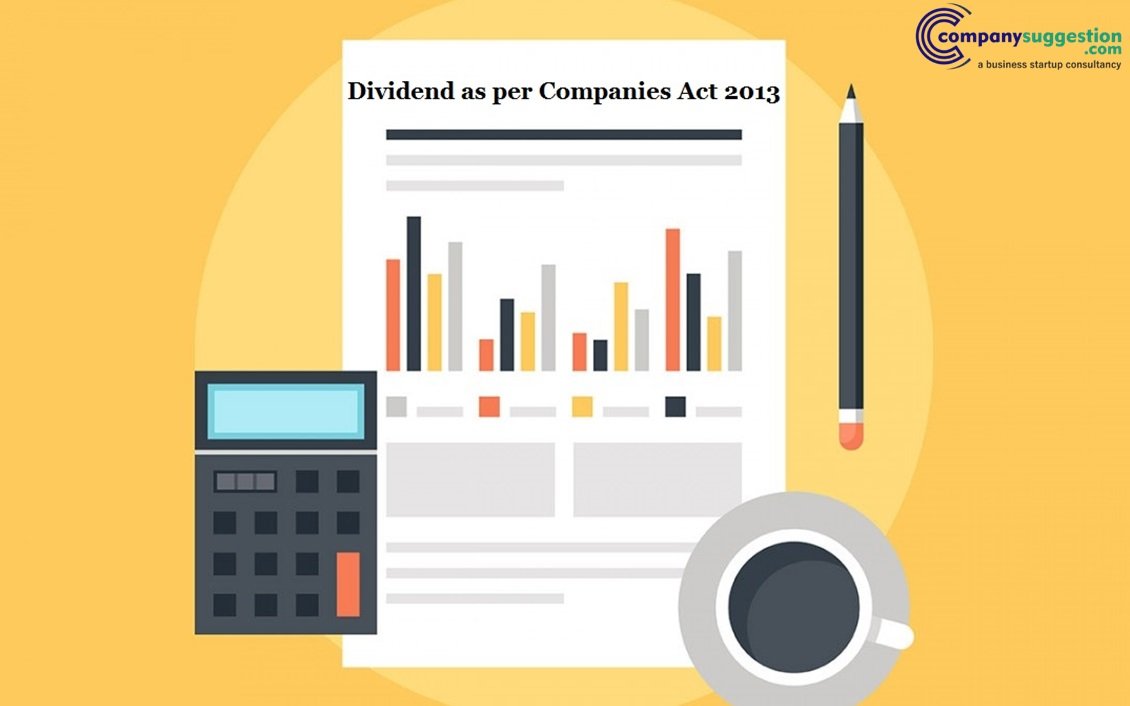Dividend as per Companies Act 2013:
Declaration And Payment of Dividend as per Companies Act 2013
Dividend refers to the reward a corporation offers to its shareholders, in cash or otherwise. Dividends can be given in various ways, such as cash payment, inventory, or some other form. It is determined by its Management Board and requires the approval of the shareholders. A dividend is the distribution of a portion of the company’s earnings, decided and managed by the company’s board of directors, and paid to a class of its shareholders.
Dividend as per Companies Act 2013:Dividend defined under Section 2(35) of the companies act, 2013 includes any interim dividend:
- Dividends are sum of money to be paid to the members of the company out of the profits made by the Company.
- It is a share of profits of the company.
- It may be noted that dividend is paid to shareholders in proportion to the amount paid-up on the share held by them.
- Preference shareholders re always paid the dividend in preference to the equity shareholders.
- All Companies subject to the provisions of the Companies Act, 2013, except companies registered under Section 8 (i.e., non-profit companies), can declare dividend.
Types of Dividend
- Interim dividend: The Board of Directors of a company may declare interim Dividend as per Companies Act 2013 during any financial year or at any time during the period from closure of financial year till holding of the annual general meeting out of the surplus in the profit and loss account or out of profits of the financial year for which such interim dividend is sought to be declared or out of profits generated in the financial year till the quarter preceding the date of declaration of the interim dividend:
- Final dividends: Dividends paid by the corporation after the financial year has been closed, and the Board of Directors accepted an AGM. The term used except as specified in the Companies Act, 2013 refers only to final dividends
Source of dividend
No dividend shall be declared or paid by a company for any financial year except—
- Profits of the company for the year for which the dividend is to be paid.
- Undistributed profits of the previous financial year,
- Moneys provided by the Central Government or a State Government for the payment of Dividend as per Companies Act 2013 in pursuance of a guarantee given by the concerned Government.
Provisions related to Declaration of Dividend At Annual General Meeting:
- Dividend is to be declared by the company at its Annual General meeting on such rate as may be recommended by board, and it has no power to declare dividend exceeding the amount recommended by the board.
- On declaration, dividend becomes a debt payable by the company to the registered shareholders, who are entitled to sue the company for the non-payment of the dividend.
- A company cannot pass a resolution for the declaration of dividend, without passing a resolution for the adoption of accounts. Hence, a company shall adopt its books of accounts first and then only, entitled to declare the dividend.
Dividend shall be paid in cash by cheque, warrant or electronically.
Conditions required to be satisfied for declaration of Dividend as per Companies Act 2013:
1) Depreciation : – In terms of the provision of section 123 of the Act, no company can pay dividend in any year without charging depreciation in the profit and loss account for the current year and that there is no balance of un provided depreciation of any year or years. Depreciation shall be provided in accordance with the provisions of Schedule II to the Companies Act, 2013
2) Transfer to Reserves :- Every company may, before the declaration of any dividend in any financial year, transfer portion of its net profit to general reserve , as it may consider appropriate to the reserves of the company.
3) Set off of previous year losses and depreciation : – A company shall not declare dividend unless carried over previous losses and depreciation not provided in previous year or years, are set off against profit of the company for the current year.
4) Free Reserves : – A company shall not declare or pay dividend out of its reserves, other than free reserves.
Procedure of Declaration and Payment of Dividend as per Companies Act 2013
- Issue atleast 7 clear days notice of the meeting of Board of directors in accordance with the sec- 173 of the companies Act – 2013.
- Hold Board meeting and pass resolutions for following purposes-
- Approving the annual accounts.
- Recommending the quantum of final dividend to be declared at the next Annual General Meeting.
- Fixing the Day, Date Time and Venue of AGM.
- Approving the Notice AGM,
- Authorizing the Company Secretory/ Director to issue the notice of AGM.
- The company may transfer to reserve such percentage as it consider appropriate of the current profits.
- Public Notice of book closure in a newspaper circulating in the district in which the registered office of the company is situated at least 7 days before the date of commencement of book closure.
- Close the register of members and the share transfer register of the company.
- Hold the AGM and pass ordinary resolution declaring the payment of dividend to the shareholders of the company as per recommendation of the Board.
- Open a separate bank account for making dividend payment and credit the same bank account with the total amount of dividend payable within 5 days of declaration of dividend.
- Dispatch dividend warrants within 30 days of the declaration dividend. in case of joint shareholders, dispatch the warrant to the first named shareholder.
- Instructions to all the specified branches of bank that dividend should be paid at par should be sent by the bank.
- Publish a company notice in a newspaper circulating the district in which the registered office of the company is situated to the effect that dividend warrants have been posted and advising those members of the company who do not receive them within a period of 15 days, to get in touch with the company for appropriate action.
- Issue bank drafts and/or cheques to those members who inform that they received the dividend warrants after the expiry of their currency period or their dividend warrants were lost in transit after satisfying that the same have not been encashed.
- Arrange for transfer of unpaid or unclaimed dividend to a special account named Ünpaid dividend account A/c” within 7 days after expiry of the period of 30 days of declaration of final dividend.
Punishment For Failure to Distribute Dividend as per Companies Act 2013 (Section 127):
Punishment For Failure to Distribute Dividend as per Companies Act 2013, Where a dividend has been declared by a company but has not been paid or the warrant in respect thereof has not been posted within thirty days from the date of declaration to any shareholder entitled to the payment of the dividend, every director of the company shall, if he is knowingly a party to the default, be punishable with imprisonment which may extend to 2 years and with fine which shall not be less than 1000 rupees for every day during which such default continues and the company shall be liable to pay simple interest at the rate of eighteen per cent per annum during the period for which such default continues.
Exception (Where No Penalties Applies):
(a) where the dividend could not be paid by reason of the operation of any law;
(b) where a shareholder has given directions to the company regarding the payment of the dividend and those directions cannot be complied with and the same has been communicated to him;
(c) where there is a dispute regarding the right to receive the dividend;
(d) where the dividend has been lawfully adjusted by the company against any sum due to it from the shareholder; or
(e) where, for any other reason, the failure to pay the dividend.













